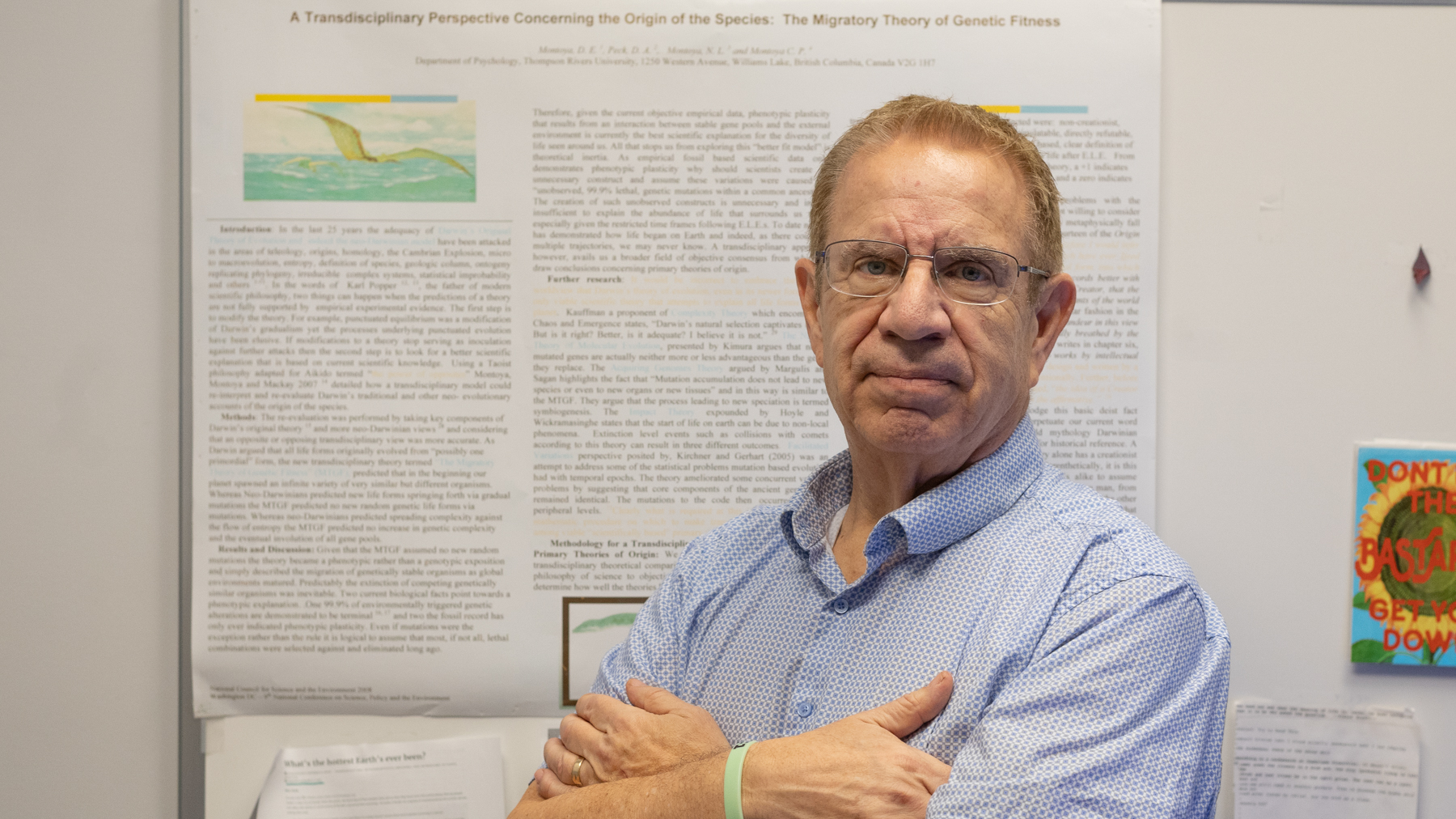Students can often be intimidated by their professors and may need help approaching them. Through this ongoing series, the Omega will introduce students to several professors at TRU, uncovering the humanity and personalities of our educators.
Often, in academia, there are various professors who stand out not only for their scholarly achievements but also for the profound impact that they have on students. Professor Chris Montoya is known by students as a thought-provoking educator who uses different methods, often challenging his students to examine sometimes difficult, different perspectives.
As a senior lecturer in the psychology department at Thompson Rivers University, Montoya teaches a wide range of courses, including experimental psychology, abnormal psychology, personality psychology and more.
“[Chris] has a very gentle demeanour and speaks with a lot of wisdom and knowledge. Listening to him explain complex subjects is always pleasant and fruitful because of that,” said Omar Chinyanga, a former student of Montoya.
Reflecting on the influence of Montoya’s teaching, Anzhelika Mostovshchikova stated, “ Montoya’s engaging teaching style and focus on modern treatment approaches for movement disorders made his new PSYC 3710 class incredibly impactful for my learning. His generosity in providing his textbook for free and his emphasis on holistic perspectives made this class both accessible and interesting.”
Montoya’s interest in brain and behaviour research began in his early years when he witnessed his father battle Parkinson’s disease, a brain-based condition.
“My dad had Parkinson’s disease, which causes [physical] shaking. I wanted to understand the brain more deeply, which eventually led me to work in stem cell research,” Montoya said. The aforementioned experience solidified his interest in the complexity of human behaviour and cognition, setting the stage for an academic career focused on the research of the brain and behavioural science.
While studying at the University of Calgary, Montoya worked as an experimental neurosurgeon. His experiences at UoC, particularly in electrophysiology and hippocampal research, played a key role in shaping his approach to the science of the brain.
“I was very fortunate to participate in hands-on surgeries, and we focused on studying the hippocampus, which is critical for memory,” Montoya said.
The professor’s intellectual interests extend beyond the confines of traditional psychology, which has helped him to build a transdisciplinary approach, integrating concepts from various fields in his research and teaching.
“If you look at it from an enlightened perspective, there is no psychology, no physics, no mathematics; they are all the same. They are all what we call metaphorical convergent validity. All these theories point to a grand truth,” Montoya explained. By blending ideas from biology, chemistry, physics, and even Indigenous thought, Montoya encourages students to see the unity underlying scientific and philosophical inquiry.
This mindset also shapes his teaching style, whereby students are regularly challenged to consider complex questions that stretch beyond the traditional boundaries of a single discipline. “I ask my students, ‘Was it evolution or was it creation?’ Evolution and creation are not mutually exclusive,” Montoya said.
Terrence Ngari, a student at TRU, was quick to heap praise onto the professor. “Chris is the ultimate definition of a professor who challenges students to think out of the box. He triggers students to utilize their reasoning capability to the fullest. He is an all-rounded walking, talking encyclopedia not only in his career but also in most, if not all aspects of his life. On top of that, he is clear and articulate in his communication, and without forgetting, he’s approachable.”
Montoya integrates spirituality into academic learning, drawing inspiration from the concept of faith. In the classroom, Montoya has adopted prayer as a practice, which he believes aligns with TRU’s commitment to indigenization, blending spiritual beliefs with his scientific and philosophical teachings. For him, faith and science can coexist and he encourages students to reflect on how concepts of creation and God intertwine with science.
Montoya’s teaching philosophy is grounded in the Socratic method, where dialogue and inquiry drive students’ learning process. He often engages students in discussions that challenge perceptions of the world around them.
In addition to his academic pursuits, Montoya uses his personal experiences to help students navigate complex societal and political issues.
“I’ve seen politicians come and go, but the country is run by bureaucrats. Things don’t really change whether it’s conservative, NDP, or liberal,” Montoya said.
Montoya’s research has explored various topics, from the psychological effects of hyperbaric environments to the influence of electromagnetic fields on cortical cell functions. His goal is to encourage students to think beyond traditional psychological boundaries and consider the broader implications of their work.
Beyond the classroom, Montoya is a dual citizen of the United States of America and Canada and is a self-described undefeated champion in foosball. “I’m really good at foosball and ping pong. No one has beaten me—not even the kids,” Montoya said, adding that foosball is another way for him to connect with his family.
The Omega’s Professor Spotlight is a series where we reintroduce you to some of the university’s most popular faculty members. If you would like to nominate a professor, lecturer, or sessional instructor for their own Professor Spotlight, you’re encouraged to email the Omega’s arts editor, Augustus Holman, by email at auggietaylor6284@gmail.com.

